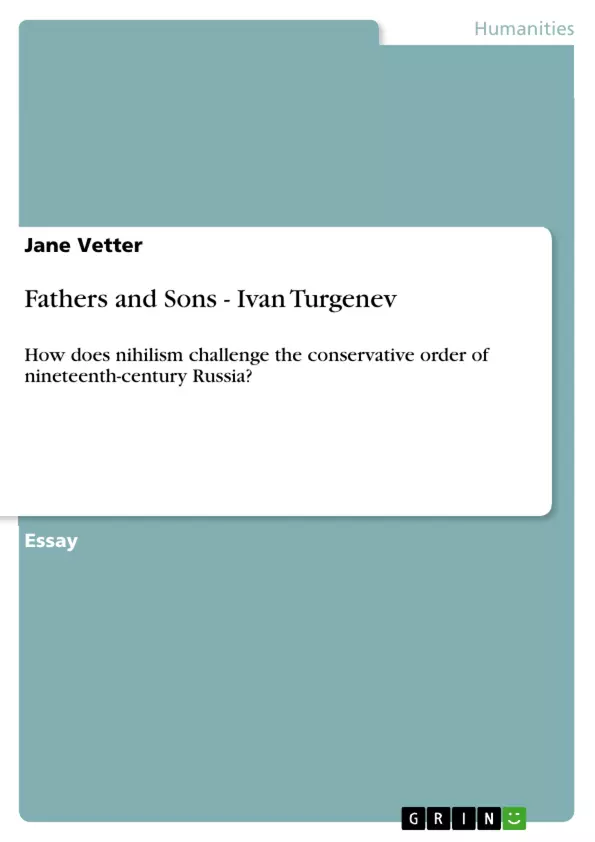Since the uprising of the Decembrists in 1825, Russia had to deal with recurrent insurgence and turmoil due to popular Russian discontent with the prevailing Tsarist system, missing human rights, inequalities, and poverty. During the Crimean War between 1853 and 1856, Russia tried to expand its territory at the expense of the Ottoman Empire; however, the allies France, Great Britain and Piedmont-Sardinia defeated Russia soundly. It became apparent that Russia did not only lack behind in regard to infrastructure and latest technology but it also was not able to carry on its policy of serfdom while aspiring toward economic growth with the help of rapid industrialization.
Turgenev’s novel Fathers and Sons is set in the middle of these turbulent times with concentration on two major progressive movements, liberals and nihilists, opposing each other. The main protagonists are graduate Arkady Kirsanov and his friend Bazarov, prospective doctor of medicine, who Arkady sees as his mentor and teacher of nihilistic ideas. Both pay a visit to both their parents as well as new acquaintances in the country.
Table of Contents
- How does nihilism challenge the conservative order of nineteenth-century Russia?
- The first clash between the two generations
- The second clash between the old order and nihilism
- Last but not least, Bazarov's nihilistic point of views clash with traditional family beliefs
Objectives and Key Themes
This essay examines the ways in which nihilism challenges the conservative order of nineteenth-century Russia through an analysis of Ivan Turgenev’s novel, *Fathers and Sons*. The essay focuses on the conflict between the older, more traditional generation represented by the Kirsanov family and the younger, more radical generation, epitomized by Bazarov, a self-proclaimed nihilist.- The impact of nihilistic ideas on traditional values and societal norms
- The tension between individual freedom and social responsibility
- The role of love, family, and social class in shaping individual identity
- The challenges faced by a rapidly changing society in the face of industrialization and political upheaval
- The limitations and potential pitfalls of nihilism as a social and philosophical ideology
Chapter Summaries
This essay explores the conflict between the old and new generation in 19th-century Russia through the lens of Turgenev's *Fathers and Sons*. It focuses on Bazarov, a nihilist, and his clashes with the more conservative, traditional views of his contemporaries. The essay begins by introducing the context of 19th-century Russia, including the impact of the Crimean War and the rise of progressive movements like liberalism and nihilism. It then introduces the main protagonists, Arkady Kirsanov and his friend Bazarov, a nihilist, and their encounters with different societal groups. The first major section explores the first clash between the two generations. It focuses on the debate between Bazarov and Pavel, Arkady's uncle, highlighting the contrasting views of nihilism and traditional values. The essay analyzes how Bazarov's nihilistic views challenge societal norms and traditional beliefs, including those surrounding love, family, and social class. The second section delves into the second clash between the old order and nihilism, specifically examining the interactions between Bazarov and women. It explores how nihilistic ideas clash with traditional views of love and marriage, specifically highlighting Bazarov's rejection of romantic love and his cynical view of women. Finally, the essay examines how Bazarov's nihilistic views challenge traditional family values through his interactions with his own parents. This section highlights the disconnect between the older generation's attempt to adapt to new values and the nihilistic generation's dismissal of traditional values altogether.Keywords
The main keywords and focus topics of this essay include: nihilism, conservatism, liberalism, nineteenth-century Russia, social change, traditional values, love, family, individual freedom, social responsibility, industrialization, societal upheaval, and the clash between generations.Frequently Asked Questions
What is the central conflict in Turgenev's "Fathers and Sons"?
The central conflict is the generational gap between the traditional, aristocratic older generation (the "fathers") and the radical, nihilistic younger generation (the "sons") in 19th-century Russia.
How is Nihilism defined in the novel?
Nihilism is portrayed through the character Bazarov as the total rejection of established authorities, traditions, and romantic values in favor of scientific facts and utility.
Who is the main protagonist representing the "sons"?
Jewgeni Bazarov is the primary protagonist, a medical student and self-proclaimed nihilist who acts as a mentor to his friend Arkady Kirsanov.
What historical context influenced the novel?
The novel is set during a period of social upheaval in Russia following the Crimean War, marked by the rise of liberalism, industrialization, and the eventual end of serfdom.
How does Bazarov's ideology clash with family life?
Bazarov's cynical view of love and his dismissal of traditional family sentiment create tension when he visits his parents and interacts with women, highlighting the limitations of his rigid ideology.
- Quote paper
- Jane Vetter (Author), 2006, Fathers and Sons - Ivan Turgenev, Munich, GRIN Verlag, https://www.grin.com/document/116467



